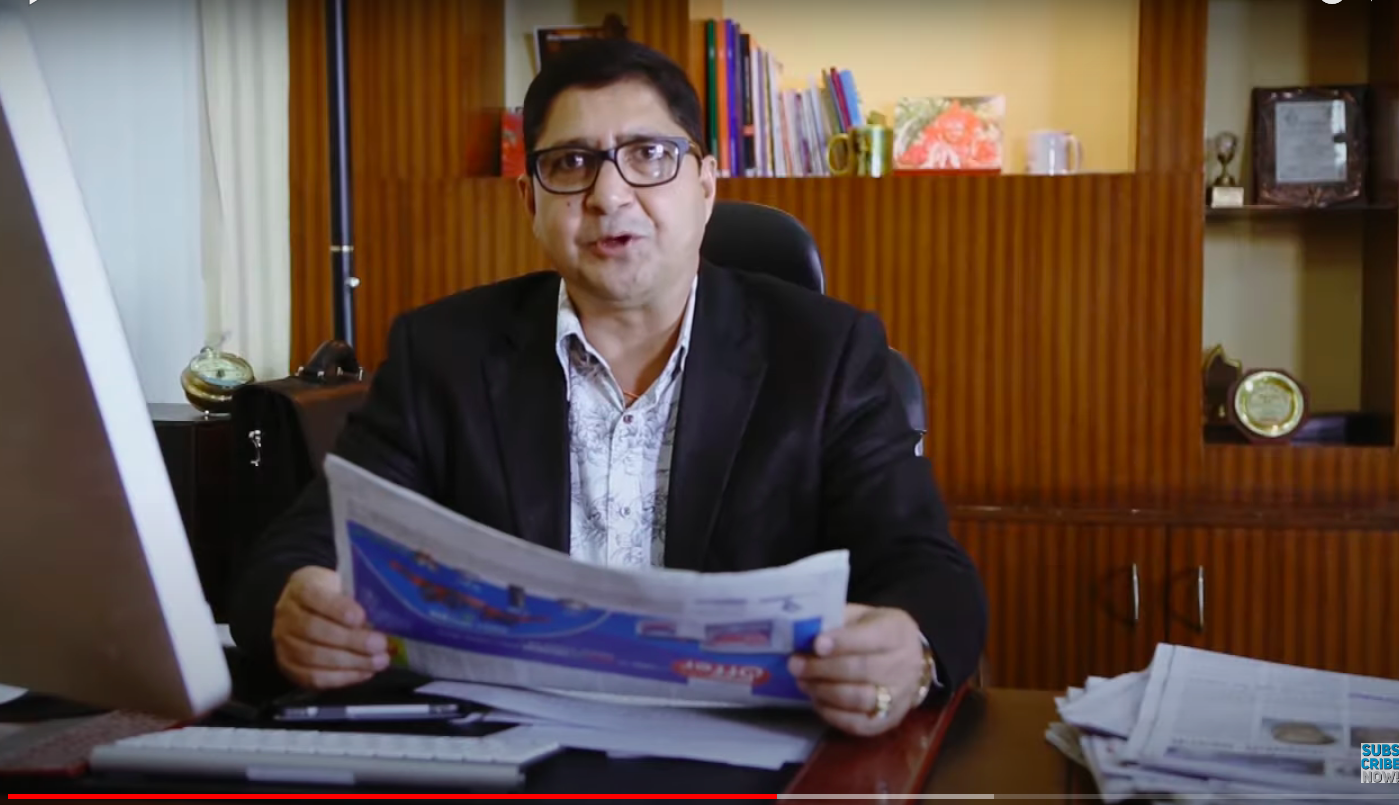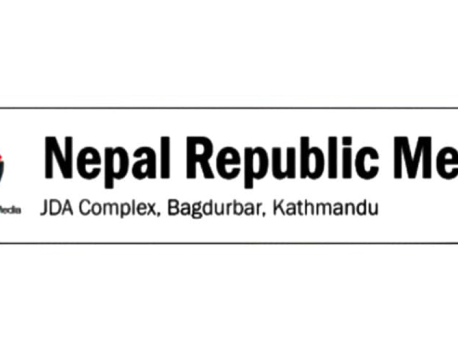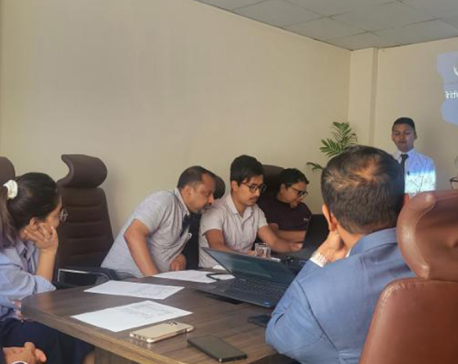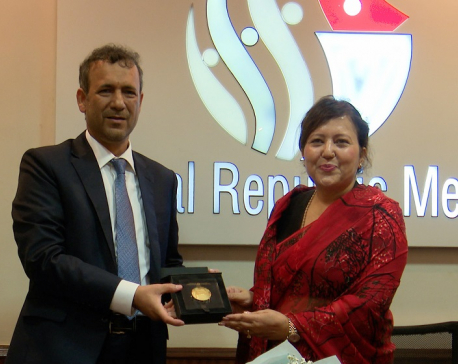
OR
#Interview with Nepal Republic Media Chairman
‘Media is not just a business, but also a public service’
Published On: May 14, 2023 08:30 AM NPT By: Republica | @RepublicaNepal

Binod Raj Gyawali, chairman of Nepal Republic Media Limited, has been active in Nepali media industry for more than three decades. Chairman Gyawali, who entered the media industry at a very young age, is currently on a campaign to transform his private media company to a public company. In his conversation with Republica, Gyawali shares his thoughts on various issues including the plan of Nepal Republic Media Limited to float its shares to the general public, possible consequences of this in Nepali media landscape and future prospects of media industry in general. Excerpts:
Republica: How did you come up with the idea to transform Nepal's leading media house, Nepal Republic Media, which has been publishing Nagarik Daily and Republica Daily, into a public company?
Gyawali: The media should always be transparent. The role played by the Nepali media in the political, social and economic transformation of the country is not hidden from anyone. And now, when the development of information technology has reached its peak, the responsibility of the media has also increased. At this time, transparency is crucial for making the flow of information more accountable. Transparency in the media is more effective when it is a public company. In a public company, there is involvement of the public. Directors representing the common shareholders will also be on the Board of Directors. All activities of the company will have to be made transparent for the general public with greater accountability.
Additionally, this helps strengthen corporate governance. Publications of media companies that practice transparency become more credible. The media is always accountable to the readers. It should be active also to become more reliable to the readers and its audience in days to come. When a family business reaches its third generation, its sustainability and profitability is correlated with governance and institutionalization. Many businesses including media businesses around the world have been converted to public limited which has propelled their growth, scalability enabling sustainability in this ever changing and competitive world.
You have been running the media for a long time. Why is there a need to issue an IPO of a media house now?
I have worked in the media industry for over 30 years. I have always wanted inclusion and diversity in a true sense by including readers and the general public in our decision making process. This was something I envisioned 20 years ago while I was in a partnership running the largest media in the country. With the general public’s participation and involvement I hope to see an increase in public ownership. It is in fact possible to operate this company as a private company in the long run. However, true transparency, public accountability and long-term sustainability can only be achieved with public participation in the true sense. To me, the media is not just a business but a crucial service and responsibility to the people and the nation.
It has been more than three decades of democratic practice in our country. Nepal is trying to transform with respect to all kinds of exercises in the meantime. Society wants change. And this wind of change has also touched the media. On the one hand, each person is involved in the flow of information, and on the other, the distribution of credible information has become equally necessary. In this situation, we have no choice but to follow the footsteps of that change and move forward. To fulfill this desire for social change, journalism needs to reach greater heights. An informed civil society has become necessary to face the challenges of today and we have adopted this path to contribute to it.
Nepal Republic Media is in the process of issuing primary shares (IPO) as the first company among media houses to become a public company. Where has the preparation to issue IPO reached?
From today (Sunday), we are issuing shares for common people working abroad and colleagues of Nepal Republic Media Limited. The process of issuing shares to the general public has also progressed. Our colleagues are excited to buy shares of the company. We are confident that this enthusiasm will also be reflected among the general public.
What kind of response have you received with the preparation of the IPO issue of the media house?
There is a very positive response towards us. We have also received positive messages from the media sector. Everyone has published and broadcast this news with priority. The Security Board of Nepal has also paved the way for the diversification of the stock market so that the media can also participate in it. So far, only banks and hydropower companies have been getting this opportunity. But now onwards, the media will also be able to participate in this process. It is true that no work is beyond challenge. There are also those who discuss this negatively as well. However, we have received a large number of people who have taken this positively as a good step.
How many IPOs is the company bringing to the general public? How can they apply?
We are issuing 3,525,930 units of shares to the general public, which is 35.99 percent of the total issued capital of the company.
The credit rating of the company has been done to issue the IPO. What is the condition of the company's balance sheet according to the rating?
We have received B+ in credit rating. Before COVID-19, our company was at the peak of growth. Due to COVID-19, the condition of not only ours but all other companies has deteriorated. Now, we are gradually returning to the old rhythm. Our situation will improve in the coming years. It is positive to receive this rating since we moved forward even in difficult situations. As we worked without closing our flagship publication even during the COVID-19 period, our economic situation has weakened a bit. Some companies have reduced their losses even by closing their services. As we were able to work even in difficult times, our situation will certainly improve in the days ahead. Our company will be declaring profit this year after three years of consecutive losses. Prior to COVID-19 pandemic, the turnover of our company was around Rs 700 million, but after the pandemic it has come down to Rs 170 million.
Our source of income is newspaper sales and advertisement. Compared to the pre-Covid-19 situation, sales have decreased by about 300 percent. Most of our loss comes from COVID-19 pandemic. However, the last two years have shown a growth in sales. Our EPS (earnings per share) networth and other financial indicators have shown positivity which is a relief and a motivating factor to do better.
What is the basis for investors to invest in this company with confidence?
Media is an organization based on human resources. Even in difficult times during the Covid-19, the fighting spirit of our colleagues and journalists has saved us. As an investor, the first thing we invest is in people. Resilience and dedication of our colleagues and journalists is commendable and that alone should give confidence in the company. And as I mentioned earlier, even our financial indicators show growth and positivity this year onwards. The vision NRM carries is to empower every Nepali with knowledge and information and to make informed decisions. We are confident that the general public will invest with confidence keeping in mind the vision of our company alongside our track records of fulfilling the above-mentioned goals.
What returns may the investors get from this company and at what time? How do you want to reassure them?
Our company has made an action plan to work in a profitable manner. Our profit starts from this fiscal year. We will invest the profit of the next three years in the development of the company. We have made a strong plan to distribute profits above five percent from the fourth year. The net worth per share was 93 in the fiscal year 2020/21, 84 this year as we will be issuing a number of shares of 100 in 2022/23, 108 in 2023/24 and 120 in 2024/25.
Similarly, the earnings per share are also projected to increase gradually in the coming days. It has been projected that the EPS will be 1.22 in 2022/23, 5.55 in 2023/24 and 9.66 in 2024/25.
What is the plan to mobilize the capital obtained after the company issues IPO?
We will reduce our debt from the capital we receive. Once the loan is reduced, our income increases automatically as we will not have liabilities to pay interest. In the same way, it has been planned to make our investment profitable through capacity building of journalists and increasing the credibility of the media. At present, we feel that advancing the practice of journalism by making a team of capable journalists will be more oriented for public service.
What challenges are media houses facing when the country's economy is shrinking due to various reasons including COVID-19 pandemic and Russia-Ukraine war?
Various developments including COVID-19 pandemic and Russia-Ukraine war have affected the global economy. It has an impact on our country and the organizations operating here. The negative impact on the economy has affected the media industry both directly and indirectly. However, this situation will not stay forever. After all, the economy has no choice but to gain momentum again. As all sectors develop, the media also moves forward on its own.
How have the development of digital technology and the increasing use of social media affected the media?
There are many sources of information available to people today. The mobile phone in our hand has become a means of receiving information. Although anyone can transmit information, the importance of traditional journalistic media to present such information with truth has increased even more. At present, there is a flood of 'fake information'. There is a lot of unreliable news and information. Some have suspected that traditional media is not needed now. However, the need for reliable media has increased even more now. Good journalistic practice will once again attract the common people. For that, we will increase investment in the development of journalism. We will make this industry fruitful by equipping our manpower with necessary skills and knowledge. The challenges seen now are temporary. Although the means of journalism may change, its fundamental elements will remain the same. Amidst the current challenges, there are opportunities. As the flood of misinformation increases, so does the role of responsible media.
You have been in the media industry for a long time. How do you see the future of media in Nepal?
I tell this in one word: bright. In fact, the days ahead are highly useful for the media. Today, people who use media content have increased more as compared to the past. There is also a hunger for information. Effective communication materials are essential at this time. People, who are in the dense forest of information, should be shown the right way. Due to this reason, the future of the media looks good. As I said before, the medium may have changed and will continue changing and this has a positive correlation with the need for reliable news.
Media have fulfilled their responsibility, but has the state fulfilled its obligations towards the media?
The beauty of democracy is that it allows the media to work freely. It is a self-regulating industry. Every information should be presented in an authentic manner only. At present, Prime Minister Pushpa Kamal Dahal has repeatedly said that the communication sector will be recognized as an industry. The government's view of the communication sector is positive. The current government has also promised improvising the past attempts to create laws that obstruct the communication sector. If the government works to strengthen the journalism sector, that will be a big help for us. The government should play a role in maintaining the atmosphere of independent and fearless journalism ensured by the constitution. So far, the government's initiative has been positive.
You May Like This

Nepal Republic Media’s IPO opens to general public from today
KATHMANDU, June 9: Nepal Republic Media Limited (NRML) is issuing the Initial Public Offering (IPO) to the general public from... Read More...

Nepal Republic Media allots IPOs for foreign Nepali migrants
IPOs to open for ordinary public from June 9 ... Read More...

UAE Ambassador Naqbi visits Central Office of Nepal Republic Media Limited
KATHMANDU, Sept 8: Ambassador of United Arab Emirates (UAE) to Nepal Saeed Hamdan AI Naqbi visited the Central Office of... Read More...









Just In
- Heavy rainfall likely in Bagmati and Sudurpaschim provinces
- Bangladesh protest leaders taken from hospital by police
- Challenges Confronting the New Coalition
- NRB introduces cautiously flexible measures to address ongoing slowdown in various economic sectors
- Forced Covid-19 cremations: is it too late for redemption?
- NRB to provide collateral-free loans to foreign employment seekers
- NEB to publish Grade 12 results next week
- Body handover begins; Relatives remain dissatisfied with insurance, compensation amount








Leave A Comment